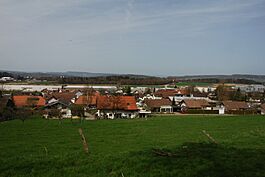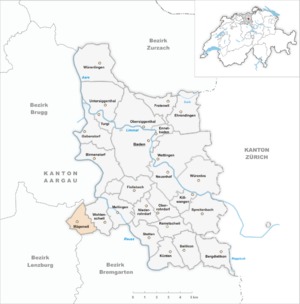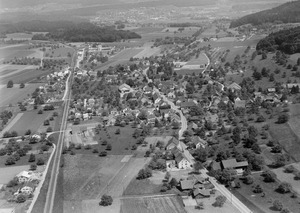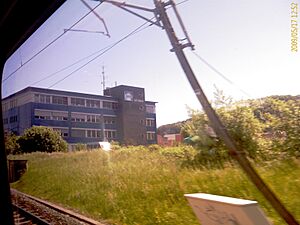Mägenwil facts for kids
Quick facts for kids
Mägenwil
|
||
|---|---|---|
 |
||
|
||
| Country | Switzerland | |
| Canton | Aargau | |
| District | Baden | |
| Area | ||
| • Total | 3.48 km2 (1.34 sq mi) | |
| Elevation | 423 m (1,388 ft) | |
| Population
(Dec 2020 )
|
||
| • Total | 2,139 | |
| • Density | 614.7/km2 (1,591.9/sq mi) | |
| Postal code |
5506
|
|
| Surrounded by | Birrhard, Brunegg, Hägglingen, Othmarsingen, Wohlenschwil | |
Mägenwil is a small town, also called a municipality, located in the Baden district. It is part of the canton of Aargau in Switzerland.
Contents
History of Mägenwil
Mägenwil has a long history. It was first mentioned in old records way back in the year 924. At that time, it was known as Maganwilare. Later, in 1273, it was called Echwile.
Geography of Mägenwil
Mägenwil covers an area of about 3.5 square kilometers (1.4 square miles). A large part of this land, about 45.7%, is used for farming. Forests cover another 30.3% of the area. The remaining 24% of the land is where buildings and roads are located.
The municipality is found in the Baden district, on the southern edge of a region called Birrfeld. Mägenwil is a linear village, which means its buildings are spread out mostly along a road. It has grown together with a smaller settlement nearby called Eckwil. Eckwil used to be its own municipality until 1905.
Mägenwil's Coat of Arms
The official description, or blazon, of Mägenwil's coat of arms is: Gules a Poppy Seedpod Or slipped and leaved. This means it shows a golden poppy seedpod with a stem and leaves on a red background.
People and Population
Mägenwil has a population of about 2,000 people. In 2008, about 17.3% of the people living here were from other countries. The population has been growing quite a bit, increasing by about 25.8% over the last ten years.
Most people in Mägenwil speak German, which is about 88.7% of the population. Other languages spoken include Serbo-Croatian (1.9%) and Albanian (1.8%).
In 2008, about 12.1% of the population were children aged 0 to 9 years old. Teenagers, aged 10 to 19, made up about 14.4% of the population. The town has a good mix of different age groups.
Most homes in Mägenwil have 3 or 4 people living in them. In 2008, nearly half of all homes were single-family houses.
The people of Switzerland are generally well-educated. In Mägenwil, about 74.1% of adults (aged 25–64) have finished high school or gone on to higher education, like a university. In the 2008/2009 school year, 176 students attended primary school in the municipality.
Here's how the population of Mägenwil has changed over time:
| Historical population | ||
|---|---|---|
| Year | Pop. | ±% |
| 1799 | 339 | — |
| 1850 | 511 | +50.7% |
| 1900 | 450 | −11.9% |
| 1950 | 633 | +40.7% |
| 2000 | 1,551 | +145.0% |
| 2010 | 1,963 | +26.6% |
Transportation in Mägenwil
Getting around Mägenwil is easy thanks to its train station. The Mägenwil railway station is a stop on the S-Bahn Zürich train line, specifically the S11 route. This connects Mägenwil to other towns and cities.
Economy and Jobs
In 2007, the unemployment rate in Mägenwil was low, at 2.06%. This means most people who wanted jobs had them.
The town has different types of jobs:
- Primary Sector: This includes jobs like farming. About 38 people work in this area, with 9 businesses.
- Secondary Sector: This involves manufacturing and industry. About 324 people work here, with 20 businesses.
- Tertiary Sector: This is the service industry, like shops, offices, and healthcare. This is the largest sector, with 1,158 people working in 95 businesses.
Many people who live in Mägenwil travel to other towns for work. In 2000, about 77.8% of residents worked outside the municipality. However, many people also travel into Mägenwil for work, showing it's a place with many job opportunities.
Religion in Mägenwil
According to a census from 2000, the main religions in Mägenwil are:
- Roman Catholic: About 45.3% of the population.
- Swiss Reformed Church: About 32.3% of the population.
A very small number of people also belong to the Christian Catholic faith.
See also
 In Spanish: Mägenwil para niños
In Spanish: Mägenwil para niños
 | Anna J. Cooper |
 | Mary McLeod Bethune |
 | Lillie Mae Bradford |







